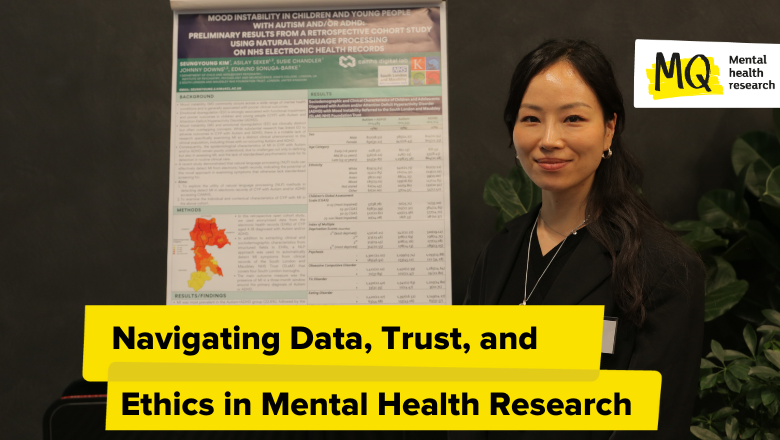
Last week, the MQ and DATAMIND Data Science Meeting & Workshop took place in London. Here is an account from early career researcher, Aeron Kim, about their experiences at the meeting.
Attending the MQ Mental Health Research and DATAMIND event at Deutsche Bank in Moorgate was a truly enriching experience, and the sleek, welcoming venue set the tone perfectly for an inspiring day. As I walked in, the MQ team greeted me warmly, helping ease any pre-event nerves as I set up my research poster in the hall. The atmosphere was buzzing with researchers, scientists, and industry professionals, all eager to connect over shared interests in mental health and data science.
The day opened with Professor Louise Arseneault’s welcome address. Having known her as a guest lecturer during my MSc at King’s College London, it was fantastic to see her again outside of the classroom. Her introduction was followed by Nicola Byrne’s insightful talk on patient data trust, exploring how legal compliance, privacy protection, and transparency serve as foundational needs in healthcare data sharing. She also emphasised the importance of meaningful public involvement—something I relate to deeply as a researcher handling patient health records. Her perspective brought attention to the human side of data science, which I believe is crucial in mental health research.
A session led by Vaibhav Narayan delved into data science’s role in neuroscience R&D, discussing both opportunities and challenges. The following coffee break allowed for informal conversations with fellow researchers, discussing their works and hearing about others’ interests in the mental health data science field. As an early career researcher and aspiring PhD candidate, connecting with senior and mid-career researchers was invaluable, especially as they shared their own experiences and insights on navigating the research landscape, providing valuable guidance along a career path I aspire to pursue.
Lunch was a highlight. As I stood by my poster, I enjoyed presenting my work on mood instability in children and young people with ADHD and/or Autism, using natural language processing on NHS electronic health records. The relaxed setting of a light lunch created a perfect space to share my findings and receive constructive feedback, which helped me feel more confident about presenting to a wider audience. It was also encouraging to discuss my research with others who were genuinely interested and knowledgeable, making it a motivating experience.
After lunch, Dr. Rob Stewart from the CRIS/NLP team gave a talk titled “The Devil’s in the Detail: Achieving Genuinely Big Clinical Data.” His presentation was especially relevant to me, as I had worked with the CRIS/NLP team for my MSc project which I presented in my poster on the day. Hearing about the complexities of natural language processing and its applications from a leader in the field was not only exciting but also deepened my appreciation for the methodologies I had used in my own research. Dr. Stewart’s insights on structuring large-scale clinical data effectively provided a practical outlook on implementing machine learning in mental health research.
The panel discussion on industry partnerships was another standout session, emphasising the importance of trust, participant involvement, and interdisciplinary collaboration in data science. The panel explored how data should be used relationally, respecting participants’ perspectives and aiming for a user-friendly approach to research design. The discussion highlighted the need for transparency and co-production, reminding us of the ethical obligations involved in data use, especially volunteer data sharing.
As the day wrapped up, I left feeling inspired, with new insights, connections, and renewed motivation to continue my work in mental health research. The event emphasised the transformative role of data science in mental health and the importance of responsible, collaborative research practices. I look forward to applying the knowledge and connections gained from this event as I pursue my PhD and remain dedicated to promoting the ethical use of patient data and making psychiatric research accessible to the public.
You can read about another early career researcher’s experiences at a Data Science event here.




